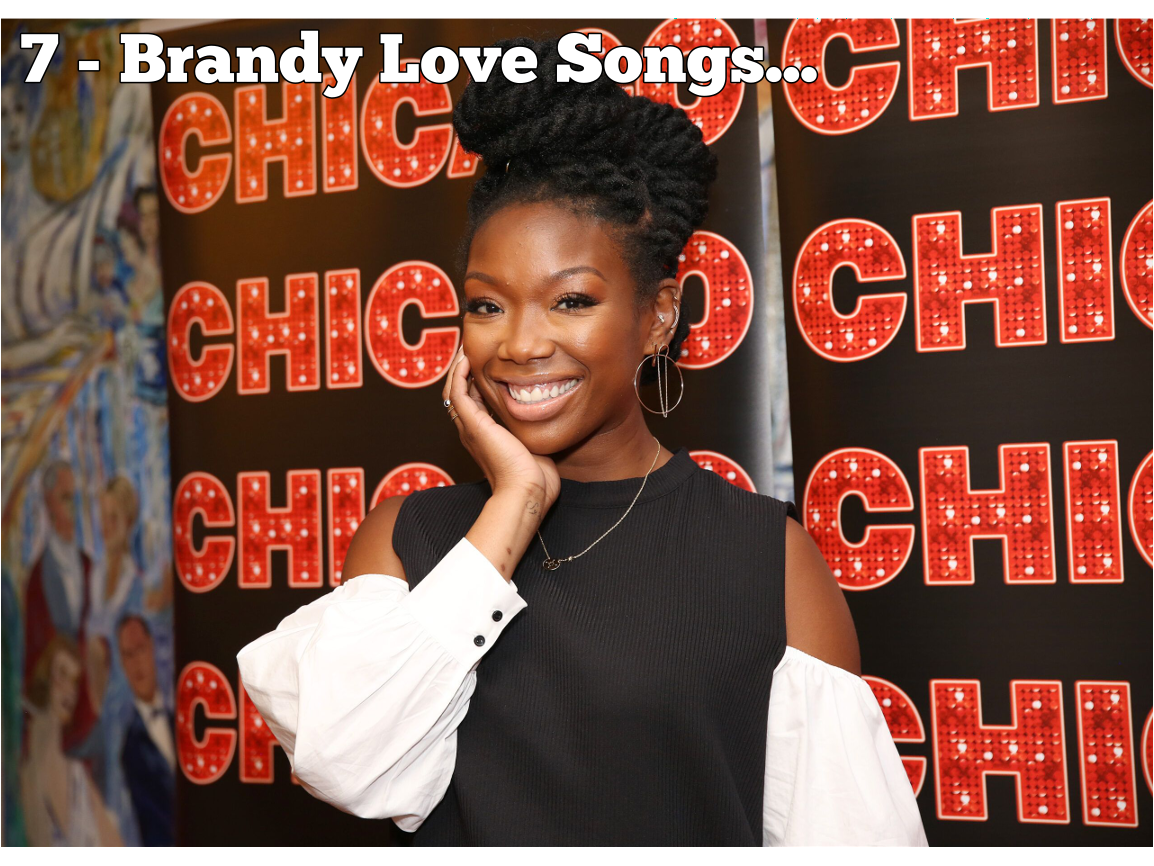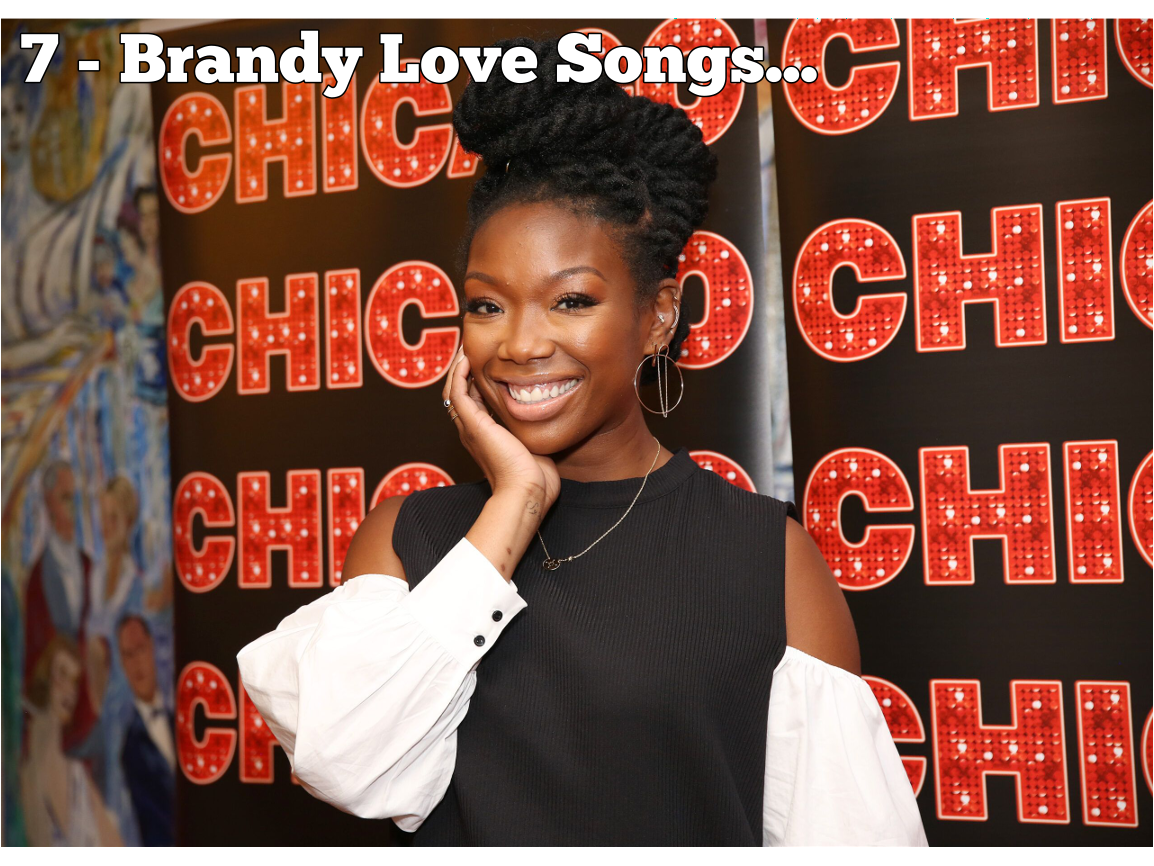-
 play_arrow
play_arrow
Praise 24/7 NO Today's Best Gospel

(ThyBlackMan.com) Brandy Norwood has long been called “The Vocal Bible,” a nickname she has rightfully earned through her unmatched vocal control, layered harmonies, and emotional intelligence as a singer. From her teenage years in the mid-1990s to her mature recordings in the 2010s and beyond, Brandy has been one of R&B’s most consistent truth tellers when it comes to love. Her music isn’t just romantic—it’s spiritual, vulnerable, and textured, offering soundscapes that feel like confessions wrapped in rhythm and soul.
This list explores seven of Brandy’s most enduring love songs, each capturing a different shade of romance—from the thrill of discovery to the ache of heartbreak, and the peace that follows when love becomes real. Decades later, these tracks remain proof that Brandy’s artistry transcends time.

1. “Have You Ever?”
Few R&B ballads from the 1990s have aged as gracefully as Brandy’s “Have You Ever?” from her Grammy-winning Never Say Never album. Written by Diane Warren and produced by David Foster, this song is Brandy’s emotional centerpiece—a haunting, aching slow jam about unrequited love that still stops listeners in their tracks.
Brandy delivers the song like someone confessing a long-hidden truth. The question “Have you ever loved somebody so much it makes you cry?” hits with universal power because everyone has been there—trapped between desire and silence. What elevates the track beyond typical pop-soul ballads of its era is Brandy’s ability to restrain emotion without losing impact. Each note feels weighed, deliberate, and honest.
From a technical standpoint, her voice on this record is flawless. Brandy uses dynamic control like an instrument—starting softly on the verses, allowing the words to breathe, and gradually building intensity toward the chorus. The modulation in her tone mirrors the internal struggle of loving someone from afar. The orchestral arrangement swells gently beneath her, never overpowering her presence, as though the music itself is bowing to the sincerity of her emotion.
Listening today, “Have You Ever?” is still a master class in vocal storytelling. Brandy’s subtle vibrato, breathy phrasing, and layered harmonies wrap around the melody like warm velvet. The song has found new life on streaming platforms and in covers by younger artists who cite her as an influence. These renditions only reinforce how timeless the track’s emotional DNA is. It remains one of those rare ballads that transcends trends—it could be released today and still climb charts.
It remains a late-night essential, the kind of song that demands quiet and introspection. Whether played through headphones during a midnight drive or in the background of a rainy evening, “Have You Ever?” endures because it captures love’s most painful question: what do you do when the one you want doesn’t want you back? Even after decades, Brandy’s delivery still invites empathy, making every listener feel seen in their solitude.
2. “Brokenhearted”
“Brokenhearted,” from Brandy’s self-titled debut album, is one of her earliest demonstrations of emotional maturity. Released when she was still a teenager, this duet with Wanya Morris of Boyz II Men was more than just a hit—it was a signal that Brandy’s voice could channel grown-woman pain even before she was grown.
The remix version, produced by Soulshock & Karlin, elevated the song into R&B royalty. Its atmospheric chords and tender tempo create the perfect canvas for Brandy’s aching delivery. Her vocals balance sweetness and sorrow, sounding like a conversation with herself as much as with her lover. When she sings, “Now I’m all alone, ’cause you’re gone,” you believe she’s feeling every syllable. There’s a vulnerability here that goes beyond performance—it’s instinctual empathy, the kind that can’t be taught.
From a cultural lens, “Brokenhearted” is emblematic of 1990s R&B’s golden age, when emotion and melody were paramount. It was a time when songs were written for longevity, not streams. The chemistry between Brandy and Wanya feels genuine, their harmonies intertwining like two souls unable to let go. The blend of their voices is almost cinematic—soft, patient, and pleading.
Nearly thirty years later, “Brokenhearted” remains as relatable as ever. It’s a song for anyone who’s had to learn the hard way that love sometimes ends in silence rather than closure. What makes it timeless is its purity—there’s no production trick distracting from the heartache, only a melody and two voices caught in emotional limbo.
Modern listeners can still find comfort in its simplicity. In an age of overproduced love songs, “Brokenhearted” feels like a relic of honesty. It’s a reminder that even youthful love leaves scars—and that those first heartbreaks often teach the deepest lessons. Every generation, from the cassette era to digital streaming, finds a piece of their own story in this song. Brandy’s teenage heartbreak became our collective memory of what it feels like to lose something before you’ve even fully had it.
3. “Wildest Dreams”
From Brandy’s Two Eleven album, “Wildest Dreams” is a mature reflection on finding real love after years of uncertainty. Produced by The Bizness and written with Sean Garrett, the song merges classic Brandy warmth with contemporary R&B sleekness. It’s her declaration that happiness—after years of heartbreak—is not only possible but deserved.
Lyrically, Brandy sounds both astonished and grateful. She sings about a love so pure that she never believed it could happen to her. Lines like “Never in my wildest dreams did I think someone could care about me” resonate because they’re sung without pretense. This isn’t the naive love of her 1990s albums—it’s the mature, reflective love of a woman who has lived. “Wildest Dreams” becomes a musical sigh of relief, a confession that healing has led to real connection.
The arrangement is minimalist, allowing Brandy’s harmonies to bloom in every direction. Her signature vocal stacking turns the chorus into a choir of gratitude. Listen closely, and you’ll hear the precision in her background vocals—each layer carrying a different shade of joy. She doesn’t just sing about love; she sonically builds it, note by note, until it becomes something tangible.
“Wildest Dreams” also captures a moment in R&B’s evolution when artists were merging traditional soul emotion with contemporary production textures. Yet Brandy remains true to her sound. Her voice grounds the modern beat in timeless soul, proving that real emotion never goes out of style.
A decade later, it remains one of her most underrated gems. It’s perfect for reflective moments—a soundtrack for self-love as much as romantic fulfillment. “Wildest Dreams” reminds listeners that love stories can evolve, and that sometimes the greatest joy is realizing you finally got it right. It stands as an anthem for emotional growth, a testament that love found after pain carries a deeper, quieter beauty.
4. “Right Here (Departed)”
When Human was released in 2008, it didn’t receive the commercial acclaim of her previous albums, but “Right Here (Departed)” stands as one of Brandy’s most uplifting love anthems. Produced by Rodney “Darkchild” Jerkins, the song blends pop-soul melodies with gospel undertones, expressing love as salvation.
Brandy’s voice is both commanding and compassionate. She doesn’t sing about romantic love alone; it’s a universal love—the kind that stands by you through storms and trials. The lyrics, “When your world feels so cold, and your friends are gone, I’ll be right here,” are more prayer than promise. There’s a sense of faith woven into her phrasing, turning the song into something spiritual rather than just sentimental.
Musically, “Right Here (Departed)” represents Brandy at her most accessible yet profound. The beat moves like a heartbeat—steady, reassuring—while her harmonies soar like church choirs. The song captures the same emotional comfort found in gospel, but frames it in modern R&B language. It’s a love song for both believers and romantics, offering hope in moments of despair.
What makes this song special is its tone of reassurance. Unlike her early heartbreak ballads, “Right Here (Departed)” projects faith. It’s the voice of someone who has learned that true love doesn’t vanish when life gets hard—it stays. The song’s emotional peak comes when Brandy belts the bridge, layering harmonies that sound like sunlight breaking through clouds. It’s as if her voice is pulling the listener out of darkness, urging them to hold on.
Today, “Right Here (Departed)” feels especially relevant. In an age defined by distance and uncertainty, its message of presence—being there for those you love—is timeless. It’s both comforting and empowering, a reminder that love can still heal. The track’s emotional resonance continues to grow, particularly among fans who see it as one of Brandy’s most spiritually grounded performances. “Right Here (Departed)” is proof that love, at its purest, is an act of faith—one that continues to echo long after the final note fades.
5. “Nothing”
Another standout from Two Eleven, “Nothing” is an overlooked love song that captures the moment when love begins to fade but hasn’t fully disappeared. Produced by Uncle Freddie, it’s sleek and slow, balancing Brandy’s traditional warmth with a touch of electronic melancholy. The song showcases how Brandy can inhabit stillness—how she uses silence and tone just as effectively as her vocal runs.
Lyrically, the song wrestles with emotional exhaustion. Brandy sings, “You can’t tell me nothing I haven’t heard before,” but beneath that defiance lies vulnerability. She’s not just confronting her partner; she’s acknowledging that she’s been here before—stuck in a love that no longer grows. It’s a dialogue between heart and mind, the kind of love song that understands endings without needing drama or spectacle.
The production gives Brandy space to perform vocal gymnastics without showing off. Her harmonies float like fog, rising and fading around the beat. In the chorus, her layered vocals sound like echoes in an empty room—a fitting metaphor for love fading into memory. The combination of minimalist production and vocal intricacy feels both modern and haunting.
What’s especially powerful about “Nothing” is how adult it sounds. There’s no villain in this story, no shouting match—just quiet realization. It’s a reflection of emotional maturity and emotional fatigue. When she sighs through lines about being tired of repeating the same patterns, her tone evokes both resignation and strength. She’s letting go without bitterness.
Listening to “Nothing” today is a reminder of Brandy’s willingness to experiment without losing her emotional core. It speaks to those who’ve reached the quiet end of a relationship—the moment when you realize love isn’t gone, but it’s no longer enough. For modern audiences navigating digital relationships, the song hits differently—it feels like a soundtrack to love’s quiet fade-out, a kind of emotional dusk. It’s a hauntingly adult perspective on romance, beautifully delivered, and a gem in her catalog that deserves rediscovery.
Finish story here; 7 Brandy Songs That Define Love, Emotion, and the Art of R&B.
Written by: Black Gospel Radio
Similar posts
-

Praise 24/7 Commercial Free
For every Show page the timetable is auomatically generated from the schedule, and you can set automatic carousels of Podcasts, Articles and Charts by simply choosing a category. Curabitur id lacus felis. Sed justo mauris, auctor eget tellus nec, pellentesque varius mauris. Sed eu congue nulla, et tincidunt justo. Aliquam semper faucibus odio id varius. Suspendisse varius laoreet sodales.
close Top popular

The Science of Happiness – Exploring Factors for Well-Being

Balancing Act: Prioritizing Your Well-Being in a Busy World

Overcoming Procrastination – Strategies for Productivity and Success

Unlocking Hidden Potential – A Guide to Personal Growth

Mindful Living – Cultivating Presence in the Modern Era

CONTACT US
- info@praise247no.com
FOLLOW US
- Praise247NO
- Praise247NO
- Praise247NO
Copyright 2024 Praise247no.com - All Rights Reserved.




Post comments (0)